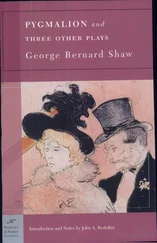Gilbert Chesterton - George Bernard Shaw
Здесь есть возможность читать онлайн «Gilbert Chesterton - George Bernard Shaw» — ознакомительный отрывок электронной книги совершенно бесплатно, а после прочтения отрывка купить полную версию. В некоторых случаях можно слушать аудио, скачать через торрент в формате fb2 и присутствует краткое содержание. Жанр: foreign_antique, foreign_prose, на английском языке. Описание произведения, (предисловие) а так же отзывы посетителей доступны на портале библиотеки ЛибКат.
- Название:George Bernard Shaw
- Автор:
- Жанр:
- Год:неизвестен
- ISBN:нет данных
- Рейтинг книги:5 / 5. Голосов: 1
-
Избранное:Добавить в избранное
- Отзывы:
-
Ваша оценка:
- 100
- 1
- 2
- 3
- 4
- 5
George Bernard Shaw: краткое содержание, описание и аннотация
Предлагаем к чтению аннотацию, описание, краткое содержание или предисловие (зависит от того, что написал сам автор книги «George Bernard Shaw»). Если вы не нашли необходимую информацию о книге — напишите в комментариях, мы постараемся отыскать её.
George Bernard Shaw — читать онлайн ознакомительный отрывок
Ниже представлен текст книги, разбитый по страницам. Система сохранения места последней прочитанной страницы, позволяет с удобством читать онлайн бесплатно книгу «George Bernard Shaw», без необходимости каждый раз заново искать на чём Вы остановились. Поставьте закладку, и сможете в любой момент перейти на страницу, на которой закончили чтение.
Интервал:
Закладка:
In the same way I have to appeal to my theoretic preface at this third point of the drama of Shaw's career. On leaving school he stepped into a secure business position which he held steadily for four years and which he flung away almost in one day. He rushed even recklessly to London; where he was quite unsuccessful and practically starved for six years. If I had mentioned this act on the first page of this book it would have seemed to have either the simplicity of a mere fanatic or else to cover some ugly escapade of youth or some quite criminal looseness of temperament. But Bernard Shaw did not act thus because he was careless, but because he was ferociously careful, careful especially of the one thing needful. What was he thinking about when he threw away his last halfpence and went to a strange place; what was he thinking about when he endured hunger and small-pox in London almost without hope? He was thinking of what he has ever since thought of, the slow but sure surge of the social revolution; you must read into all those bald sentences and empty years what I shall attempt to sketch in the third section. You must read the revolutionary movement of the later nineteenth century, darkened indeed by materialism and made mutable by fear and free thought, but full of awful vistas of an escape from the curse of Adam.
Bernard Shaw happened to be born in an epoch, or rather at the end of an epoch, which was in its way unique in the ages of history. The nineteenth century was not unique in the success or rapidity of its reforms or in their ultimate cessation; but it was unique in the peculiar character of the failure which followed the success. The French Revolution was an enormous act of human realisation; it has altered the terms of every law and the shape of every town in Europe; but it was by no means the only example of a strong and swift period of reform. What was really peculiar about the Republican energy was this, that it left behind it, not an ordinary reaction but a kind of dreary, drawn out and utterly unmeaning hope. The strong and evident idea of reform sank lower and lower until it became the timid and feeble idea of progress. Towards the end of the nineteenth century there appeared its two incredible figures; they were the pure Conservative and the pure Progressive; two figures which would have been overwhelmed with laughter by any other intellectual commonwealth of history. There was hardly a human generation which could not have seen the folly of merely going forward or merely standing still; of mere progressing or mere conserving. In the coarsest Greek Comedy we might have a joke about a man who wanted to keep what he had, whether it was yellow gold or yellow fever. In the dullest mediæval morality we might have a joke about a progressive gentleman who, having passed heaven and come to purgatory, decided to go further and fare worse. The twelfth and thirteenth centuries were an age of quite impetuous progress; men made in one rush, roads, trades, synthetic philosophies, parliaments, university settlements, a law that could cover the world and such spires as had never struck the sky. But they would not have said that they wanted progress, but that they wanted the road, the parliaments, and the spires. In the same way the time from Richelieu to the Revolution was upon the whole a time of conservation, often of harsh and hideous conservation; it preserved tortures, legal quibbles, and despotism. But if you had asked the rulers they would not have said that they wanted conservation; but that they wanted the torture and the despotism. The old reformers and the old despots alike desired definite things , powers, licenses, payments, vetoes, and permissions. Only the modern progressive and the modern conservative have been content with two words.
Other periods of active improvement have died by stiffening at last into some routine. Thus the Gothic gaiety of the thirteenth century stiffening into the mere Gothic ugliness of the fifteenth. Thus the mighty wave of the Renaissance, whose crest was lifted to heaven, was touched by a wintry witchery of classicism and frozen for ever before it fell. Alone of all such movements the democratic movement of the last two centuries has not frozen, but loosened and liquefied. Instead of becoming more pedantic in its old age, it has grown more bewildered. By the analogy of healthy history we ought to have gone on worshipping the republic and calling each other citizen with increasing seriousness until some other part of the truth broke into our republican temple. But in fact we have turned the freedom of democracy into a mere scepticism, destructive of everything, including democracy itself. It is none the less destructive because it is, so to speak, an optimistic scepticism – or, as I have said, a dreary hope. It was none the better because the destroyers were always talking about the new vistas and enlightenments which their new negations opened to us. The republican temple, like any other strong building, rested on certain definite limits and supports. But the modern man inside it went on indefinitely knocking holes in his own house and saying that they were windows. The result is not hard to calculate: the moral world was pretty well all windows and no house by the time that Bernard Shaw arrived on the scene.
Then there entered into full swing that great game of which he soon became the greatest master. A progressive or advanced person was now to mean not a man who wanted democracy, but a man who wanted something newer than democracy. A reformer was to be, not a man who wanted a parliament or a republic, but a man who wanted anything that he hadn't got. The emancipated man must cast a weird and suspicious eye round him at all the institutions of the world, wondering which of them was destined to die in the next few centuries. Each one of them was whispering to himself, "What can I alter?"
This quite vague and varied discontent probably did lead to the revelation of many incidental wrongs and to much humane hard work in certain holes and corners. It also gave birth to a great deal of quite futile and frantic speculation, which seemed destined to take away babies from women, or to give votes to tom-cats. But it had an evil in it much deeper and more psychologically poisonous than any superficial absurdities. There was in this thirst to be "progressive" a subtle sort of double-mindedness and falsity. A man was so eager to be in advance of his age that he pretended to be in advance of himself. Institutions that his wholesome nature and habit fully accepted he had to sneer at as old-fashioned, out of a servile and snobbish fear of the future. Out of the primal forests, through all the real progress of history, man had picked his way obeying his human instinct, or (in the excellent phrase) following his nose. But now he was trying, by violent athletic exertions, to get in front of his nose.
Into this riot of all imaginary innovations Shaw brought the sharp edge of the Irishman and the concentration of the Puritan, and thoroughly thrashed all competitors in the difficult art of being at once modern and intelligent. In twenty twopenny controversies he took the revolutionary side, I fear in most cases because it was called revolutionary. But the other revolutionists were abruptly startled by the presentation of quite rational and ingenious arguments on their own side. The dreary thing about most new causes is that they are praised in such very old terms. Every new religion bores us with the same stale rhetoric about closer fellowship and the higher life. No one ever approximately equalled Bernard Shaw in the power of finding really fresh and personal arguments for these recent schemes and creeds. No one ever came within a mile of him in the knack of actually producing a new argument for a new philosophy. I give two instances to cover the kind of thing I mean. Bernard Shaw (being honestly eager to put himself on the modern side in everything) put himself on the side of what is called the feminist movement; the proposal to give the two sexes not merely equal social privileges, but identical. To this it is often answered that women cannot be soldiers; and to this again the sensible feminists answer that women run their own kind of physical risk, while the silly feminists answer that war is an outworn barbaric thing which women would abolish. But Bernard Shaw took the line of saying that women had been soldiers, in all occasions of natural and unofficial war, as in the French Revolution. That has the great fighting value of being an unexpected argument; it takes the other pugilist's breath away for one important instant. To take the other case, Mr. Shaw has found himself, led by the same mad imp of modernity, on the side of the people who want to have phonetic spelling. The people who want phonetic spelling generally depress the world with tireless and tasteless explanations of how much easier it would be for children or foreign bagmen if "height" were spelt "hite." Now children would curse spelling whatever it was, and we are not going to permit foreign bagmen to improve Shakespeare. Bernard Shaw charged along quite a different line; he urged that Shakespeare himself believed in phonetic spelling, since he spelt his own name in six different ways. According to Shaw, phonetic spelling is merely a return to the freedom and flexibility of Elizabethan literature. That, again, is exactly the kind of blow the old speller does not expect. As a matter of fact there is an answer to both the ingenuities I have quoted. When women have fought in revolutions they have generally shown that it was not natural to them, by their hysterical cruelty and insolence; it was the men who fought in the Revolution; it was the women who tortured the prisoners and mutilated the dead. And because Shakespeare could sing better than he could spell, it does not follow that his spelling and ours ought to be abruptly altered by a race that has lost all instinct for singing. But I do not wish to discuss these points; I only quote them as examples of the startling ability which really brought Shaw to the front; the ability to brighten even our modern movements with original and suggestive thoughts.
Читать дальшеИнтервал:
Закладка:
Похожие книги на «George Bernard Shaw»
Представляем Вашему вниманию похожие книги на «George Bernard Shaw» списком для выбора. Мы отобрали схожую по названию и смыслу литературу в надежде предоставить читателям больше вариантов отыскать новые, интересные, ещё непрочитанные произведения.
Обсуждение, отзывы о книге «George Bernard Shaw» и просто собственные мнения читателей. Оставьте ваши комментарии, напишите, что Вы думаете о произведении, его смысле или главных героях. Укажите что конкретно понравилось, а что нет, и почему Вы так считаете.










